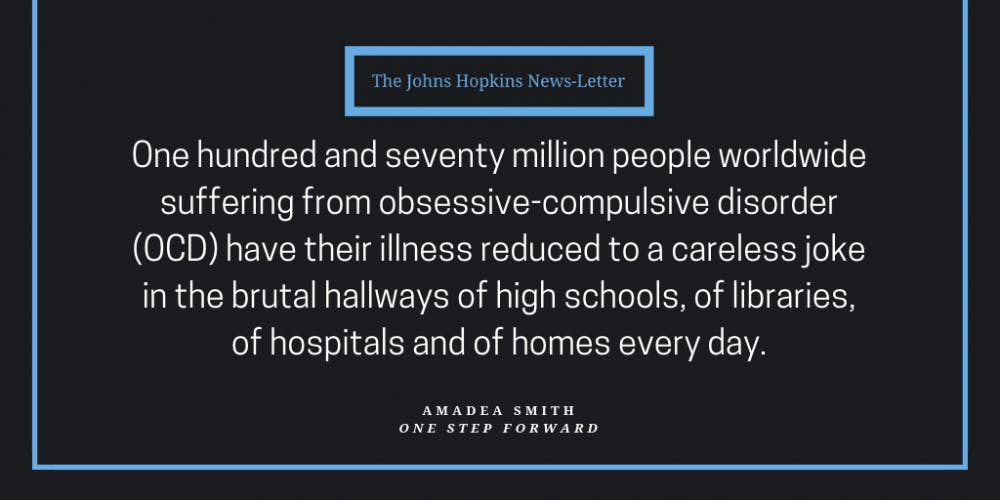
You’re with your friends, and you wash your hands thoroughly to get the Dorito crumbs out from under your fingernails. You humorously blurt out, “Sorry guys, I’m really OCD.”
You’re in class and you observe your professor organizing her desk area — arranging the pencils and pens neatly, erasing the board thoroughly, lining up the dry-erase markers by color. Your friend whispers, “Wow, OCD much?”
You’re in your dorm and your suitemate slides into your room and flips the light switch on and off, on and off, counting each time with a cunning smirk on his face. No words. You both break out laughing.
Wow.
One hundred and seventy million people worldwide suffering from obsessive-compulsive disorder (OCD) have their illness reduced to a careless joke in the brutal hallways of high schools, of libraries, of hospitals and of homes every day.
Every remark, every joke, every chuckle hurts. Actually, it stings, penetrating deep within the mind, heart and soul.
Sometimes I wish that my OCD manifested itself in stereotypical ways — repeatedly washing hands, flipping light switches on and off, needing things clean and organized. Unfortunately, it is a complex and tangled labyrinth of fear and compulsion about body image, exercise, eating, sanitation, brain function, perfection. I tell my friend what I have to do for “homework” for therapy — all of the obsessions and compulsions I have to resist — and she laughs under her breath.
Because despite the fact that washing my hands eight fewer times during my shower is so extremely difficult for me, it may sound so comically trivial to her. Because if I don’t wash my hands 12 times in the shower, I’ll break out, which means because my face is “ugly.” I’ll have to go to the gym and work out even harder and cut my caloric intake by a couple hundred calories to compensate. So yeah, maybe it would be easier to have my OCD fit into the little, nice and organized box society puts it in.
Why is it that a slight joke about cancer would bring a room to complete silence or cause a reaction of outrage, while a popularized expression about a mental illness that causes incommensurable pain and suffering continues to circulate our daily modes of communication with such power and authority?
The contrast between how physical and mental illness are perceived reminds me of a surprisingly accurate saying regarding the absurdity of OCD stereotypes: “People who say they’re a ‘bit OCD’ are actually just tidy. If they stubbed their toe, they’d probably say they’re in a wheelchair.”
Why is my pain any less than that of someone with heart disease, Parkinson’s or sickle cell anemia? Is it just because you can’t see it?
The list of stereotypes and common jokes about mental illness goes on and on: I’m so ADD. Wow that’s so bipolar. I’m suicidal all the time. Now I have PTSD lol #triggered.
Can you imagine what it feels like for someone to joke about the very illness that has uprooted your life and made it almost impossible to make it through the day?
That “thing” that you’re joking about may be what caused someone to take their own life.
These casual phrases do not merely roll off the tongue and vanish into the air after their three-second comical impact on the listener. They fundamentally change the way we perceive the legitimacy of mental illness, perhaps even unconsciously. They may deter sufferers from sharing their struggles with friends, family, coworkers or from getting help.
I’ll never forget that day my Hopkins professor said, “That is so schizophrenic.” How could the word representing a chronic, excruciatingly painful illness be used in such a normative, nonchalant way that has no bearing on what the illness actually means for the sufferer? Naturally I spent the entire class writing down exactly how I would approach him afterward. At the end of class, I explained how his statement not only lacked sensitivity, appropriateness and compassion but aided in the perpetuation of misconceptions surrounding mental illness. He ended up apologizing, and I left class feeling optimistic.
I realized that the abundance of misunderstanding and ubiquity of insensitive comments create the distinctive opportunity to learn and grow. We can change stigma. We can place a critical eye on our seemingly quotidian comments and catch ourselves. We can tactfully call out or confront those who make these kind of jokes and explain the severity of their impact on sufferers and society’s overall perception of the validity of mental illness. We can educate ourselves about the real causes, symptoms and treatments of mental illnesses.
After all, as Bill Clinton said, “Mental illness is nothing to be ashamed of, but stigma and bias shame us all.”
September is Suicide Awareness Month.
To learn more about mental illness, visit NAMI (National Alliance on Mental Illness).





